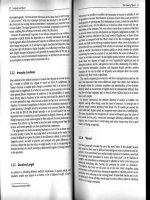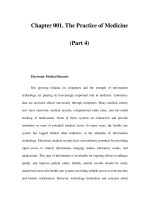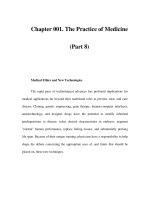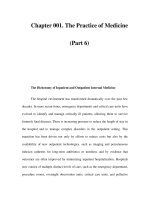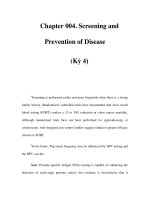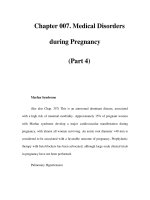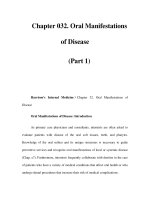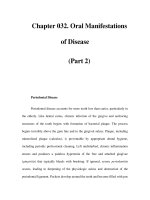Chapter 032. Oral Manifestations of Disease (Part 4) pps
Bạn đang xem bản rút gọn của tài liệu. Xem và tải ngay bản đầy đủ của tài liệu tại đây (13.56 KB, 6 trang )
Chapter 032. Oral Manifestations
of Disease
(Part 4)
Pigmented Lesions
See Table 32-2.
Table 32-2 Pigmented Lesions of the Oral Mucosa
Condition Usual
Location
Clinical
Features
Course
Oral
melanotic macule
Any area
of the mouth
Discrete or
diffuse lo
calized,
Remains
indefinitely; no
brown to black macule
growth
Diffuse
melanin
pigmentation
Any area
of the mouth
Diffuse pale to
dark-brown
pigmentation; may be
physiologic ("racial")
or due to smoking
Remains
indefinitely
Nevi
Any area
of the mouth
Discrete,
localized, brown to
black pigmentation
Remains
indefinitely
Malignant
melanoma
Any area
of the mouth
Can be flat and
diffuse, painless,
brown to black, or can
be raised and nodular
Expands and
invades early;
metastasis leads to
death
Addison's
disease
Any area
of the mouth,
but mostly
buccal mucosa
Blotches or
spots of bluish-
black to
dark-brown
pigmentation occurring
Condition
controlled by
adrenal steroid
replacement
early in the disease,
accompanied by
diffuse pigmentation of
skin; other symptoms
of adrenal
insufficiency
Peutz-
Jeghers syndrome
Any area
of the mouth
Dark-brown
spots on lips, buccal
mucosa, with
characteristic
distribution of pigment
around lips, nose, eyes,
and on hands;
concomitant intestinal
polyposis
Oral
pigmented lesions
re
main indefinitely;
gastrointestinal
polyps may become
malignant
Drug
ingestion
(neuroleptics, oral
contraceptives,
Any area
of the mouth
Brown, black,
or gray areas of
pigmentation
Gradually
disappears followi
ng
cessation of drug
minocycline,
zidovudine, quinine
derivatives)
Amalgam
tattoo
Gingiva
and alveolar
mucosa
Small blue-
black pigmented areas
associated with
embedded amalgam
particles in soft tissues;
these may show up on
radiographs as
radiopaque particles in
some cases
Remains
indefinitely
Heavy
metal
pigmentation
(bismuth, mercury,
lead)
Gingival
margin
Thin blue-
black
pigmented line along
gingival margin; rarely
seen except for
children exposed to
lead-based paint
Indicative of
systemic absorption;
no significance for
oral health
Black hairy
tongue
Dorsum
of tongue
Elongation of
filiform papillae of
tongue, which become
stained by coffee, tea,
tobacco, or pigmented
bacteria
Improves
within 1–
2 weeks
with gentle brushing
of tongue or
discontinuation of
antibiotic if due to
bacterial overgrowth
Fordyce
"spots"
Buccal
and labial
mucosa
Numerous small
yellowish spots just
beneath mucosal
surface; no symptoms;
due to hyperplasia of
sebaceous glands
Benign;
remains without
apparent change
Kaposi's
sarcoma
Palate
most common,
but may occur in
any other site
Red or blue
plaques of variable size
and shape; often
enlarge, become
nodular and may
Usually
indicative of HIV
infection or non-
Hodgkin's
lymphoma; rarely
fatal, but may
ulcerate
require treatment for
comfort or cosmesis
Mucous
retention cysts
Buccal
and labial
mucosa
Bluish-clear
fluid-
filled cyst due to
extravasated mucous
from injured minor
salivary gland
Benign;
painless unless
traumatized; may be
removed surgically
